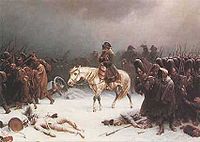- Moscow 1812: Napoleon's Fatal March
-
Moscow 1812: Napoleon's fatal march 
Book coverAuthor(s) Adam Zamoyski Country United States Language English Subject(s) French invasion of Russia Genre(s) War, History Publisher HarperCollins Publication date August 3, 2004 Media type Print (Hardcover) Pages 672 ISBN 0061075582 OCLC Number 55067008 Dewey Decimal 940.2/742/0947 22 LC Classification DC235 .Z35 2004 Moscow 1812: Napoleon's Fatal March is a non-fiction book analysing the events and circumstances during the French Invasion of Russia and the events during the reign of Napoleon, which would, ultimately, mark the ending of the Napoleonic empire after his troops were defeated after attempting to access Moscow. The book was written by Adam Zamoyski and first published on August 3, 2004 by HarperCollins;[1] receiving positive reviews by critics and the media.
Plot
Napoleon I of France was, at the time, a very prominent military and political figure, desiring to create a French-governed Europe. He succeeded in annexing many countries to France, placing his relatives and friends as monarchs in those countries. He managed to subdue Prussia and force her to become his ally, and to a great extent did the same to Austria. After winning a war with Russia, he made even the Russian Tzar Alexander (1801) his ally. Only two countries in Europe still resisted France's attempt at domination: United Kingdom and Spain. He failed when attempting to invade Britain and destroy it via a constant blockade.[2] After the execution of duke d'Enghien, however, Tzar Alexander began to hate and detest Napoleon, and began to cooperate with the United Kingdom, disrupting the continental blockade. Napoleon decided then to wage war on Russia, in order to get her back as a French ally. In June 1812, the French invaded Russia on Napoleon's orders, making their way east towards Moscow, suffering large losses caused by lack of food, desertion, disease, exhaustion and battles. Napoleon eventually "conquered" Moscow, only to see the deserted city being set on fire by the Russians themselves, on the order of their commanders. After staying too long in the scorched city, Napoleon finally decided to march back, suffering enormous losses caused by harassment by the Russian troops, the disastrous battle at the crossing of Berezina river, and agonizing cold (down to -30 °C)
Napoleon's army of more than 500,000 soldiers was annihilated, thus marking a turning point in world affairs and events around the world.[1]
Reception
The Washington Post reviewer Anne Applebaum commented: "Certain historical events become so covered in myth and significance, so overlaid with patriotism and emotion, that over time many people forget what really happened and why. Napoleon's fatal 1812 march on Moscow is one such event."[3] HarperCollins commented that "Moscow 1812 is a masterful work of history;" as well as being "dramatic, insightful, and enormously absorbing."[4] Michael Burleigh of The Sunday Times wrote "Adam Zamoyski's account of the 1812 campaign is so brilliant that it is impossible to put aside."[5]
References
- ^ a b Moscow 1812: Napoleon's Fatal March. Google Books. http://books.google.com/books?id=piyhGwAACAAJ&dq=Moscow+1812:+Napoleon%27s+Fatal+March. Retrieved 2008-01-16.
- ^ "Moscow 1812: Napoleon's Fatal March". Amazon.com. http://www.amazon.com/gp/reader/0061075582/ref=sib_dp_srch_bod?v=search-inside&keywords=&go.x=14&go.y=15&go=Go%21. Retrieved 2008-01-10.
- ^ "Out in the Cold. Reviewed by Anne Applebaum". Washington Post. 2004-08-08. http://www.washingtonpost.com/wp-dyn/articles/A44099-2004Aug5.html. Retrieved 2008-01-16.
- ^ "From the Publisher". Barnes & Noble. http://search.barnesandnoble.com/booksearch/isbnInquiry.asp?z=y&EAN=9780061086861. Retrieved 2008-01-17.
- ^ Burleigh, Michael. Back cover of Moscow 1812: Napoleon's Fatal March. Retrieved on 2008-01-17
Categories:- Books about military history
- Napoleonic Wars books
Wikimedia Foundation. 2010.

